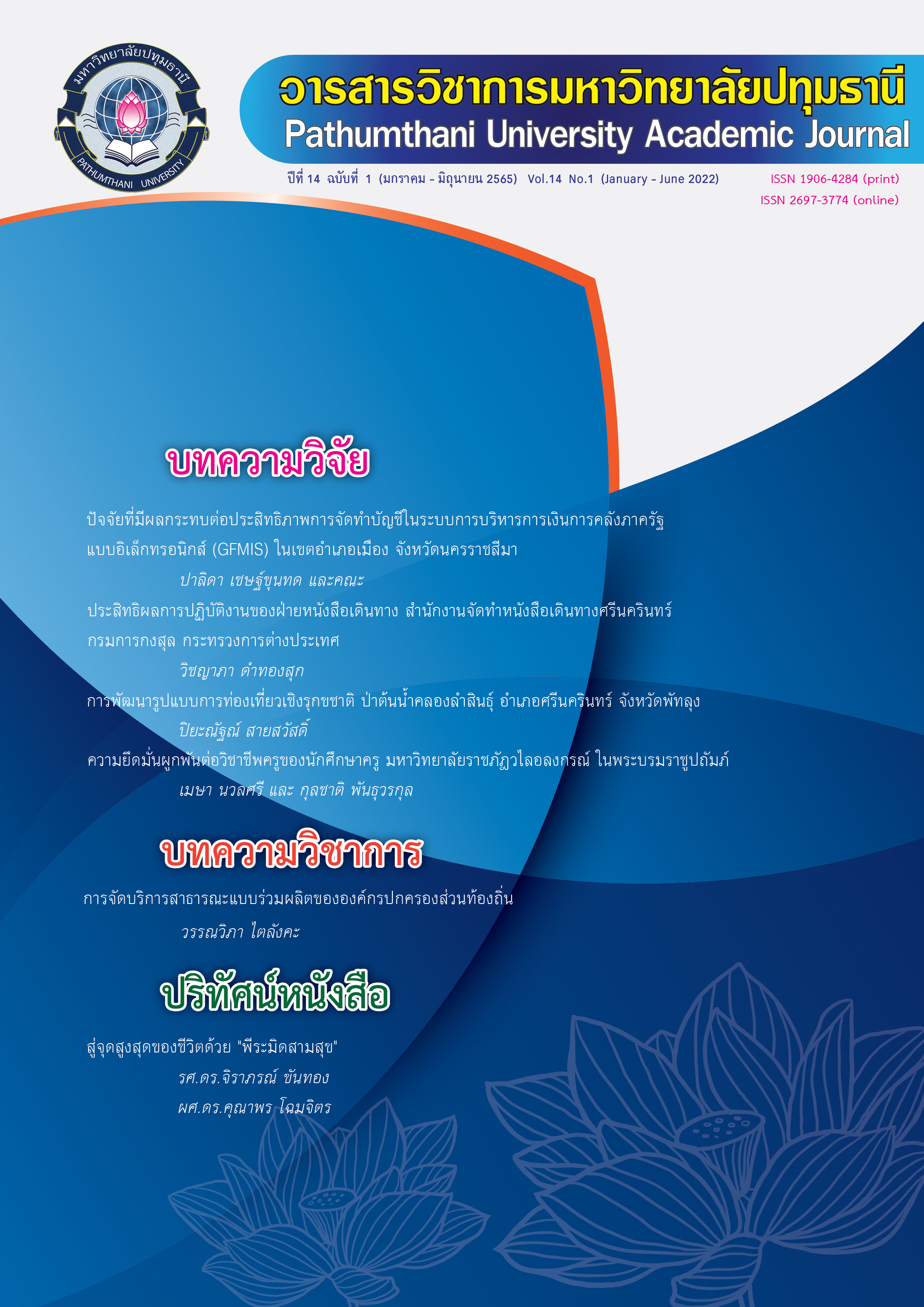PUBLIC SERVICE MANAGEMENT THROUGH CO-PRODUCTION OF LOCAL GOVERNMENT ORGANIZATION
Keywords:
Public Service through Co-Production , New Public Services , Public Services of Local GovernmentsAbstract
Future of public service management must be equal both social and economic dimensions, able to assimilate all groups of people in society and heading to improve quality of life. And that is an important goal of the country's development. This article aims to reflect the importance of co-production of public service arrangements, which is a new public service mission. It is imperative that local government organization need to understand the context. Restricted regulations and state monopolies may no longer be the right approach to local development. Local government organization should act as a key mechanism in uniting all sectors to achieve the lowest cost co-production of civil society, private business sector and public services, either a juristic person or a non-juristic person by accepting cooperation in investment from the private sector through competition between talent people. Bring up to the creation of a quality-of-life system. Especially the co-production of public services in the infrastructure, transportation and energy. For Social Protection Responsibility dimension, in labor training, labor market of the local people, including caring for the elderly and disabled; by co-operating with central and provincial agencies; in addition, the co-production of public services between local government organizations and co-operative is another mission that local government organizations should accept cooperation from competent network partners. This is because in the decentralization process, mechanisms and measures must be created that aim to create a good quality of life for people common understanding. A strong commitment to the philosophy and values of decentralization. It is an issue that all parties should be an aware in order to create value for the development of local communities.
References
กรมส่งเสริมการปกครองท้องถิ่น. มาตรฐานการบริหารและการบริการสาธารณะขององค์กรปกครองส่วนท้องถิ่น. [ออนไลน์]. เข้าถึงได้จาก http://www.dla.go.th/work/e_book/eb1/stan1.htm
ชมพูนุช หุ่นนาค. (2560). “การบริการสาธารณะใหม่เพื่อรับใช้พลเมือง”. วารสารมนุษยสังคมปริทัศน์. ปีที่ 19 ฉบับที่ 1 (มกราคม-มิถุนายน). หน้า 125-139.
วุฒิสาร ตันไชย. (2559). รูปแบบและประเภทการจัดบริการสาธารณะขององค์กรปกครองส่วนท้องถิ่น. กรุงเทพมหานคร : สถาบันพระปกเกล้า.
วุฒิสาร ตันไชย และคณะ. (2558). ข้อเสนอเชิงนโยบาย นวัตกรรม การพัฒนารายได้ขององค์กรปกครองส่วนท้องถิ่น. กรุงเทพมหานคร : สถาบันพระปกเกล้า.
สรัญพัทธ์ เอี๊ยวเจริญ และ กุลสกาวว์ เลาหสถิต. (2562). “การบริการสาธารณะแนวใหม่กับความสอดคล้องของวัฒนธรรมไทย”. วารสารการเมืองการปกครอง. ปีที่ 9 ฉบับที่ 3. (กันยายน-ธันวาคม). หน้า 219-232.
สถาบันพระปกเกล้า, วิทยาลัยพัฒนาการปกครองท้องถิ่น. (2550). ความร่วมมือระหว่างองค์กรปกครองส่วนท้องถิ่น รูปแบบ และความเป็นไปได้. กรุงเทพมหานคร: สถาบันพระปกเกล้า.
สำนักงานคณะกรรมการพัฒนาระบบราชการ. (2564). การบริหารงานภาครัฐแบบมีส่วนร่วม. [ออนไลน์]. เข้าถึงได้จาก https://www.opdc.go.th/content/Mjc4Nw
อำนวย บุญรัตนไมตรี. (2558). “แนวคิดการจัดทำบริการสาธารณะของรัฐและองค์กรปครองท้องถิ่น”. วารสารการเมืองการปกครอง. ปีที่ 6 ฉบับที่ 1. หน้า 25-37.
อรุณี สัณฐิติวณิชย์. (2558). “การสร้างการร่วมกันผลิตในชนบท: กรณีศึกษาการจัดการขยะของเทศบาลน้ำยืน จังหวัดอุบลราชธานี”. Veridian E-Journal, Silpakorn University ฉบับภาษาไทย สาขามนุษยศาสตร์ สังคมศาสตร์ และศิลปะ. ปีที่ 8 ฉบับที่ 1. หน้า 690-699.
Charlie B. Tyer. (1989). “Municipal Enterprises and Taxing and Spending Policies: Public Avoidance and Fiscal Illusions”. Public Administration Review. Vol. 49 No. 3. pp.229-230. [Online]. From: https://www.jstor.org/stable/977004
Dong, L. (2015). Public Administration Theories: Instrumental and Value Rationalities. PALGRAVE MACMILLAN: United states-a division of St. martin’s Press.
Gulick, Luther. (2004). “Notes on the Theory of Organization,” in Shafritz, M. Jay & Hyde, C. Albert. Classics of Public Administration. Wadswort : Cengage Learning, pp.446 - 449.
Hood, Christopher. (1991, March). “A Public Management for all Seasons?,” in Public Administration. Vol. 69. No. 1: pp.3-19. [Online]. From: https://eclass.uoa.gr/modules/document/file.php/PSPA108/4NMP%20all%20seasonsfulltext.pdf
Katz, Daniel & Kahn Robert. (2004). “Organization and System Concept,” in Shafritz, M. Jay & Hyde, C. Albert. Classics of Public Administration. Wadswort: Cengage Learning, pp.450 - 455.
Khoo, M. and Fong, Y. L. (2014). Redefining Engagement: Lessons for the Public Service from Our Singapore Conversation. Issue 13. ETHOS.
Loffler, E. (2005). “Governance and Government: Networking with External Stakeholders,” in Public Management and Governance. Tony Bovaird and Elke Loffler (eds.) London: Taylor & Francis Group.
Mark Sandford. (2016). Local Government: Alternative Models of Service Delivery. New York: The House of Commons Library.
Osborne, P. Stephen (2010). “Introduction the (New) Public Governance: A Suitable Case for Treatment?”. in The New Public Governance: Emerging Perspectives on the Theory and Practice of Public Governance. Edited by Osborne, Stephen P. London and New York: Routledge, pp.1-16.
Peters, B. G. (2010). “Meta-governance and Public Management,” in The New Public Governance? Emerging Perspectives on the Theory and Practice of Public Governance. Stephen P. Osborne (ed.). London: Routledge.
Steven, J. Ott. (2004). “Understanding Organizational Culture,” in Shafritz, M. Jay & Hyde, C. Albert. Classics of Public Administration. Wadswort: Cengage Learning. pp.315-326.
Zhang, G. (2007). Public Administration. Beijing: Peking University.
Downloads
Published
How to Cite
Issue
Section
License
Copyright (c) 2022 Wanwipha Tailangka

This work is licensed under a Creative Commons Attribution-NonCommercial-NoDerivatives 4.0 International License.
บทความที่ได้รับการตีพิมพ์เป็นลิขสิทธิ์ของวารสารมหาวิทยาลัยปทุมธานี
ข้อความที่ปรากฎในบทความแต่ละเรื่อง เป็นความคิดเห็นส่วนตัวของผู้เขียน กองบรรณาธิการไม่จำเป็นต้องเห็นด้วยเสมอไป และไม่มีส่วนรับผิดชอบใด ๆ ถือเป็นความรับผิดชอบของผู้เขียนแต่เพียงผู้เดียว



